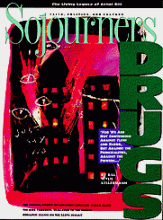I was up early in my Chicago hotel room and turned on the television to get more news of the previous day's Connecticut primary. The first words I heard were insurgent candidate and upset winner Jerry Brown's, intoning the biblical text from which I would be preaching that morning to SCUPE's National Urban Congress: "Without a vision, the people perish." It's becoming apparent to many Americans that we have a vision problem.
The issue was first officially named when George Bush joked, in a now famous remark, that he wasn't very good at "the vision thing." Subsequent events have proven the president right, but they have also shown that it isn't very funny.
In New York two weeks later, Brown and Bill Clinton slugged it out in the nastiest primary so far. The sordid affair featured a media circus, angry voters, and a low turnout that reflected public disgust and the often expressed majority sentiment for better options. Fifty percent of the voters believed the winner (Clinton) lacks the honesty and integrity to be president, and voters seemed to trust his opponent even less.
Low voter turnout, disappointment with the choices, and frustration with the direction of the country have characterized most of the primaries thus far. As many as 100 members of Congress may decide to leave office this year amid the cloud of corruption, paralysis, and growing public resentment. And all the candidates, including George Bush, can't say enough about how much they stand for change.
So far, most of the energy and enthusiasm of this presidential election campaign have been generated by the three "protest candidates." Jerry Brown, Pat Buchanan, and now Texas billionaire H. Ross Perot have each struck a nerve. Though the three have wildly different platforms, each has articulated the political alienation in growing sectors of the electorate.
Read the Full Article
